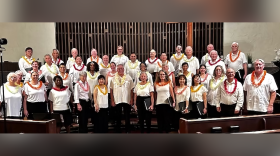DAVE DAVIES, HOST:
This is FRESH AIR. The 63-year-old Danish composer Hans Abrahamsen is relatively little-known in this country. But the charismatic Canadian soprano and conductor Barbara Hannigan has helped create a new piece that might change that and bring Abrahamsen worldwide attention. It's called "Let Me Tell You." And classical music critic Lloyd Schwartz has this review.
(SOUNDBITE OF HANS ABRAHAMSEN COMPOSITION, "LET ME TELL YOU")
BARBARA HANNIGAN: (Singing) Let me tell you how it was.
LLOYD SCHWARTZ, BYLINE: That's the icy music that begins the Danish composer Hans Abrahamsen's song cycle "Let Me Tell You." The singer is the mesmerizing Canadian soprano Barbara Hannigan, who first chilled my blood as the innocent yet seductive young wife in George Benjamin's opera "Written On Skin." In "Let Me Tell You," she's the mysterious incarnation of Shakespeare's Ophelia.
Her connection to this music, though, is more than just as a singer. She was deeply involved with the conception and creation of this piece. A friend of the Welsh music critic, novelist and librettist Paul Griffiths, Hannigan, with Griffiths' wife, conspired to give him the perfect birthday present - a new piece of music. It was Hannigan's idea to commission Abrahamsen to set passages from Griffiths' fascinating novel "Let Me Tell You," which is not only written in the voice of Ophelia but uses only the 483 different words Ophelia utters in "Hamlet."
Abrahamsen, with his transparent textures and slippery tonality, was the perfect composer for this project. "Let Me Tell You" had its premiere in December 2013 with the Berlin Philharmonic, conducted by Andris Nelsons, who is now the music director of the Boston Symphony Orchestra. The piece just won this year's $100,000 Grawemeyer prize, perhaps the most prestigious award for contemporary music.
Hannigan has now already sung it in a dozen venues in Europe and North America, a rarity for such a new work. In February, I heard it with the Boston Symphony led by Nelsons. And at the end, after a full minute of stunned silence, it got one of the most sustained ovations I've ever heard for a new piece. At a public symposium with the composer, the librettist and the illustrious Shakespeare scholar Stephen Greenblatt, Barbara Hannigan talked about meeting with Abrahamsen and how he asked her for a lesson in the history of vocal techniques that ended up lasting four hours.
So the vocal line in "Let Me Tell You" incorporates the rapid repeated notes used by Monteverde in the 17th century and the brilliant coloratura of the 19th century bel canto operas of Bellini and Donizetti.
(SOUNDBITE OF HANS ABRAHAMSEN COMPOSITION, "LET ME TELL YOU")
HANNIGAN: (Singing) Night, day - there is no difference for me. What will make the difference is if you are...
SCHWARTZ: Barbara Hannigan's singing is also ravishingly lyrical, as when Ophelia finally wanders off into the falling snow.
(SOUNDBITE OF HANS ABRAHAMSEN COMPOSITION, "LET ME TELL YOU")
HANNIGAN: (Singing) The snow flowers are all like each other, and I cannot keep my eyes on one.
SCHWARTZ: Abrahamsen actually seems obsessed with snow. He feels it and hears it. A few days after the BSO concert on a snowy night in Boston, the superb contemporary music group Sound Icon devoted an entire concert to Abrahamsen that included one of his masterpieces, "Schnee," "Snow," a kaleidoscopic hour-long work which includes sleigh bells, two pianos that often sound like sleigh bells and a percussionist who moves smooth or rough pieces of paper around on a table, producing what the composer calls a whisper, whisker-like sound. There's a gong that's struck only once in the entire piece marked pianissimo and dolcissimo - very quiet and very sweet.
(SOUNDBITE OF HANS ABRAHAMSEN COMPOSITION, "LET ME TELL YOU")
SCHWARTZ: But Hans Abrahamsen isn't just a composer of interesting sounds. His music explores questions of time and memory, nature and human isolation. And what is music if not time, Ophelia sings in "Let Me Tell You." Time of now and then tumbled into one another, time turned and loosed, time sweet and harsh. Most important, these haunting works are also extremely moving. Without affection music means nothing, Ophelia says in Paul Griffiths' novel. It is snow on your grave.
DAVIES: Lloyd Schwartz teaches in the creative writing MFA program at the University of Massachusetts Boston and is senior editor of classical music for New York Arts. On tomorrow's show, Washington Post veterans Michael Kranish and Marc Fisher talk about Donald Trump - his early life, his business deals, his use of publicity and celebrity, his personal life and the lesson he learned from New York power lawyer Roy Cohn.
(SOUNDBITE OF ARCHIVED RECORDING)
MICHAEL KRANISH: When they hit you, hit back 10 times harder.
DAVIES: Their new book based on the work of a team of Post reporters and more than 20 hours of interviews with Trump himself is called "Trump Revealed." Hope you can join us.
(SOUNDBITE OF RY COODER SONG, "DAVENPORT BLUES")
DAVIES: FRESH AIR'S executive producer is Danny Miller. Our technical director and engineer is Audrey Bentham. Our associate producer for online media is Molly Seavy-Nesper. Roberta Shorrock directs the show. For Terry Gross, I'm Dave Davies.
(SOUNDBITE OF RY COODER SONG, "DAVENPORT BLUES") Transcript provided by NPR, Copyright NPR.
NPR transcripts are created on a rush deadline by an NPR contractor. This text may not be in its final form and may be updated or revised in the future. Accuracy and availability may vary. The authoritative record of NPR’s programming is the audio record.




